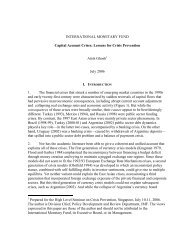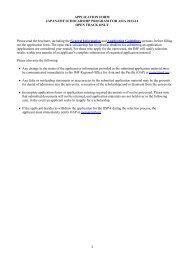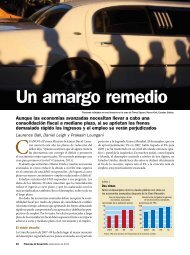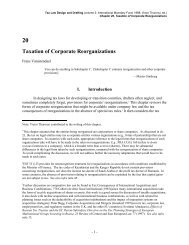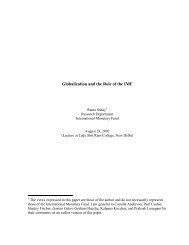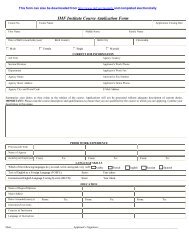Insolvency â why a special regime for banks? by Eva Hupkes ... - IMF
Insolvency â why a special regime for banks? by Eva Hupkes ... - IMF
Insolvency â why a special regime for banks? by Eva Hupkes ... - IMF
Create successful ePaper yourself
Turn your PDF publications into a flip-book with our unique Google optimized e-Paper software.
The United Kingdom is an example of a jurisdiction where the banking law does not provide<br />
<strong>for</strong> a <strong>special</strong> <strong>regime</strong>, but where the general corporate insolvency <strong>regime</strong> applies to <strong>banks</strong>. 114<br />
The procedure that is typically used is an administration order. 115 It was used to good effect<br />
in the Barings case. 116 The court issues an administration order and appoints an administrator,<br />
typically on application <strong>by</strong> the bank directors with support of the Financial Services Authority<br />
(FSA). The FSA, however, also has the power to make such application. In the course of the<br />
procedure both the FSA and the court may give directions to the court-appointed<br />
administrator. Thus, the U.K. system also bears the potential <strong>for</strong> conflict should these<br />
authorities differ, although to date this has not occurred. 117<br />
Special rules must ensure a smooth transition between regulatory procedures and judicial<br />
liquidation procedures, should such apply to <strong>banks</strong>. As long as there are prospects <strong>for</strong><br />
continued operation, e.g., <strong>by</strong> means of a merger, take-over, assumption of whole or part of the<br />
bank’s assets and liabilities, etc., powers should remain with the bank supervisor, as only the<br />
bank supervisor can determine whether the prerequisites <strong>for</strong> continued operations are being<br />
met. However, where there are no prospects <strong>for</strong> continued operation, there is a need <strong>for</strong><br />
coordination with other competent authorities, such as the bankruptcy courts and the deposit<br />
insurance agency. The interplay between bank regulatory law and general insolvency law and<br />
cooperation of the authorities involved need to be explicitly addressed in the law.<br />
Special rules <strong>for</strong> the protection of the financial system<br />
As mentioned above, what distinguishes a bank insolvency from a commercial bankruptcy is<br />
that the <strong>for</strong>mer may entail risk to the entire economic system, 118 propagated through the<br />
insolvent bank’s counter parties. If the counter party is unable to absorb the shortfall resulting<br />
from a bank’s defaulting on a contract (e.g., a <strong>for</strong>eign exchange contract, repurchase<br />
agreement, securities trading, swaps option, <strong>for</strong>ward transactions, etc.) it may default on its<br />
same time, the bankruptcy court of the Canton of Berne initiated judicial insolvency<br />
proceedings granting a moratorium and appointing a commissioner. The coexistence of the<br />
liquidator and the commissioner caused frictions due to conflicting competencies and<br />
responsibilities and, eventually, led to the needed re<strong>for</strong>m of the legal framework.<br />
114 See Andrew Campbell and Peter Cartwrigth, Banks in Crisis: the legal response, 115 et<br />
seq., 2002.<br />
115 Where a bank has become insolvent or is about to become insolvent the Financial Services<br />
Authority (FSA) generally has two choices: it can either present a petition <strong>for</strong> an<br />
administration order or a petition <strong>for</strong> the winding up of the bank where there is no realistic<br />
prospect of avoiding insolvent liquidation. See Campbell and Cartwright, supra note 114, at<br />
126 et seq.<br />
116 Campbell and Cartwright, supra note 114, at 141.<br />
117 Cf. Campbell and Cartwright, supra note 114, at 161 (pointing out the general willingness<br />
of the judiciary to cooperate with the FSA).<br />
118 Systemic risk is the risk that the failure of a market participant to meet its contractual<br />
obligations may in turn cause other market participants to default, with the chain reaction<br />
leading to broader financial difficulties.<br />
24





